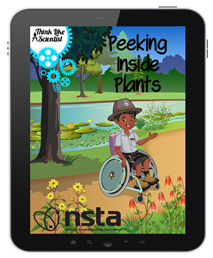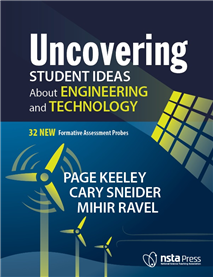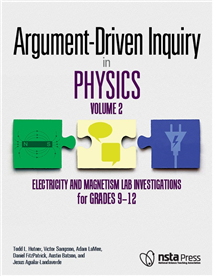All Resources
Lesson Plan
Lesson Plan
Journal Article
By Amee Jeanette Hennig, Brooke A. Whitworth, and Allison Huff Macpherson
Journal Article
By Erin Peters Burton, Peter Rich, Timothy Cleary, Stephen Burton, Anastasia Kitsantas, Garrett Egan, and Jordan Ellsworth
Journal Article
Versatile 3D Printed Colorimetry Toolkits
By Claudia Bode, William G. Welch, Sarah Abeita, and Julian R. Silverman
Interactive E-book Kids
The Geology on the Move e-Book is an interactive book where learners study the geologic features of weathering and erosion by embarking on virtual geology field trips. In the first field trip, learners board a raft and travel down the Colorado Rive...
Interactive E-book Kids
In the Peeking Inside Plants eBook, learners explore plant structures (stems, leaves, flowers, roots, and fruit) in order to build an argument about how these internal and external structures are responsible for the growth, survival, and reproduction...
Lesson Plan
Web Seminar
Teacher Tip Tuesday: COVID-19 – Ideas for Instruction, March 31, 2020
Join us on Tuesday, March 31, 2020, starting at 7:00 pm ET for an informal discussion focused on instruction of the COVID-19 disease. for elementary and secondary teachers of science....
eBook
Have you been wondering how well your students understand engineering and technology concepts? Have you been wishing for formative assessment tools in both English and Spanish? If so, this is the book for you. Like the other 11 books in the bests...
eBook
Are you interested in a three-dimensional approach to helping your high school physics students learn the practices of science, including constructing explanations and engaging in argument from evidence? By using argument-driven inquiry (ADI) for hig...
eBook
Novel Engineering, K–8: An Integrated Approach to Engineering and Literacy (e-book)
With the Novel Engineering approach, “students become excited about what they are reading, writing, designing, and building! This excitement in turn helps them make strides in engineering and literacy, as well as in their abilities to work together...
Web Seminar
Archive: Science Update: Tropical Climatology and Hurricane Hazards, May 13, 2020
This web seminar will provide an overview of the seasonality, timing, and risks associated with Tropical weather systems. We will provide a broad cursory examination of the meteorological and climatological factors that underpin the challenges of for...
Web Seminar
Archive: Transforming Science Learning: Hurray! STEM Is Here to Stay, April 15, 2020 (7:00 pm ET)
How can STEM help us achieve the vision of a scientifically literate society while also equipping our kids with the problem-solving skills to succeed in today’s workplace? Join us for an inspiring discussion on contemporary STEM education packed wi...
Web Seminar
Archive: Transforming Science Learning: Hurray! STEM Is Here to Stay, April 15, 2020 (12:00 pm ET)
How can STEM help us achieve the vision of a scientifically literate society while also equipping our kids with the problem-solving skills to succeed in today’s workplace? Join us for an inspiring discussion on contemporary STEM education packed wi...
Web Seminar
Kids bring a wealth of ideas and experiences into the classroom. When we create opportunities for students to share ideas, we can develop a community of learners where every voice is valued and every voice helps build understanding of big ideas in sc...
Web Seminar
Kids bring a wealth of ideas and experiences into the classroom. When we create opportunities for students to share ideas, we can develop a community of learners where every voice is valued and every voice helps build understanding of big ideas in sc...
Web Seminar
How can we ensure that students will be able to take what they know and can do to the next grade level and have the confidence to apply their learning to real-world situations at every age? Explore how sensemaking equips our kids to seize opportuniti...
Web Seminar
Join us on Wednesday, April 1, 2020, starting at 12:00 pm ET for a web seminar in the Transforming Science Learning series from NSTA. ...
NSTA Press Book
Uncovering Student Ideas About Engineering and Technology: 32 New Formative Assessment Probes
New in 2020! Download and read a sample chapter from this book to learn more.Have you been wondering how well your students understand engineering and technology concepts? Have you been wishing for formative assessment tools in both English and Spani...
By Page Keeley, Cary Sneider, Mihir Ravel
Journal Article
Synthesizing Geologic Data Into An Argument for Plate Tectonic Theory
By Michelle Schpakow
Journal Article
Supporting Students In Writing Scientific Explanations
By Mary Koppal, Meredith N. Long, Leah Donovan, Damisha Drakes, Sarah Q. Pappalardo, and Jo Ellen Roseman







